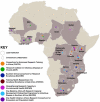A research agenda for helminth diseases of humans: health research and capacity building in disease-endemic countries for helminthiases control
- PMID: 22545167
- PMCID: PMC3335878
- DOI: 10.1371/journal.pntd.0001602
A research agenda for helminth diseases of humans: health research and capacity building in disease-endemic countries for helminthiases control
Abstract
Capacity building in health research generally, and helminthiasis research particularly, is pivotal to the implementation of the research and development agenda for the control and elimination of human helminthiases that has been proposed thematically in the preceding reviews of this collection. Since helminth infections affect human populations particularly in marginalised and low-income regions of the world, they belong to the group of poverty-related infectious diseases, and their alleviation through research, policy, and practice is a sine qua non condition for the achievement of the United Nations Millennium Development Goals. Current efforts supporting research capacity building specifically for the control of helminthiases have been devised and funded, almost in their entirety, by international donor agencies, major funding bodies, and academic institutions from the developed world, contributing to the creation of (not always equitable) North-South "partnerships". There is an urgent need to shift this paradigm in disease-endemic countries (DECs) by refocusing political will, and harnessing unshakeable commitment by the countries' governments, towards health research and capacity building policies to ensure long-term investment in combating and sustaining the control and eventual elimination of infectious diseases of poverty. The Disease Reference Group on Helminth Infections (DRG4), established in 2009 by the Special Programme for Research and Training in Tropical Diseases (TDR), was given the mandate to review helminthiases research and identify research priorities and gaps. This paper discusses the challenges confronting capacity building for parasitic disease research in DECs, describes current capacity building strategies with particular reference to neglected tropical diseases and human helminthiases, and outlines recommendations to redress the balance of alliances and partnerships for health research between the developed countries of the "North" and the developing countries of the "South". We argue that investing in South-South collaborative research policies and capacity is as important as their North-South counterparts and is essential for scaled-up and improved control of helminthic diseases and ultimately for regional elimination.
Conflict of interest statement
The authors have declared that no competing interests exist.
Figures


Similar articles
-
A research agenda for helminth diseases of humans: towards control and elimination.PLoS Negl Trop Dis. 2012;6(4):e1547. doi: 10.1371/journal.pntd.0001547. Epub 2012 Apr 24. PLoS Negl Trop Dis. 2012. PMID: 22545161 Free PMC article. Review.
-
A research agenda for helminth diseases of humans: social ecology, environmental determinants, and health systems.PLoS Negl Trop Dis. 2012;6(4):e1603. doi: 10.1371/journal.pntd.0001603. Epub 2012 Apr 24. PLoS Negl Trop Dis. 2012. PMID: 22545168 Free PMC article. Review.
-
A research agenda for helminth diseases of humans: the problem of helminthiases.PLoS Negl Trop Dis. 2012;6(4):e1582. doi: 10.1371/journal.pntd.0001582. Epub 2012 Apr 24. PLoS Negl Trop Dis. 2012. PMID: 22545164 Free PMC article. Review.
-
[Research priorities for the control and elimination of major helminthiases].Zhongguo Ji Sheng Chong Xue Yu Ji Sheng Chong Bing Za Zhi. 2013 Apr;31(2):155-9. Zhongguo Ji Sheng Chong Xue Yu Ji Sheng Chong Bing Za Zhi. 2013. PMID: 24809202 Chinese.
-
A research agenda for helminth diseases of humans: basic research and enabling technologies to support control and elimination of helminthiases.PLoS Negl Trop Dis. 2012;6(4):e1445. doi: 10.1371/journal.pntd.0001445. Epub 2012 Apr 24. PLoS Negl Trop Dis. 2012. PMID: 22545160 Free PMC article. Review.
Cited by
-
A research agenda for helminth diseases of humans: towards control and elimination.PLoS Negl Trop Dis. 2012;6(4):e1547. doi: 10.1371/journal.pntd.0001547. Epub 2012 Apr 24. PLoS Negl Trop Dis. 2012. PMID: 22545161 Free PMC article. Review.
-
A systematic approach to capacity strengthening of laboratory systems for control of neglected tropical diseases in Ghana, Kenya, Malawi and Sri Lanka.PLoS Negl Trop Dis. 2014 Mar 6;8(3):e2736. doi: 10.1371/journal.pntd.0002736. eCollection 2014 Mar. PLoS Negl Trop Dis. 2014. PMID: 24603407 Free PMC article.
-
Prevalence and Risk Factors for Intestinal Protozoan Infections with Cryptosporidium, Giardia, Blastocystis and Dientamoeba among Schoolchildren in Tripoli, Lebanon.PLoS Negl Trop Dis. 2016 Mar 14;10(3):e0004496. doi: 10.1371/journal.pntd.0004496. eCollection 2016 Mar. PLoS Negl Trop Dis. 2016. PMID: 26974335 Free PMC article.
-
Evaluation of the European foundation initiative into African research in neglected tropical diseases by the African fellows.PLoS Negl Trop Dis. 2013;7(3):e2019. doi: 10.1371/journal.pntd.0002019. Epub 2013 Mar 14. PLoS Negl Trop Dis. 2013. PMID: 23516641 Free PMC article. No abstract available.
-
Articulating the ultimate objectives of research capacity strengthening programmes: Why this is important and how we might achieve it.F1000Res. 2024 Aug 8;13:909. doi: 10.12688/f1000research.153447.1. eCollection 2024. F1000Res. 2024. PMID: 39246823 Free PMC article.
References
-
- Boatin BA, Basáñez MG, Prichard RK, Awadzi K, Barakat RM, et al. A research agenda for helminth diseases of humans: towards control and elimination. PLoS Negl Trop Dis. 2012;6:e1547. doi: 10.1371/journal.pntd.0001547. - DOI - PMC - PubMed
-
- Lustigman S, Prichard RK, Gazzinelli A, Grant WN, Boatin BA, et al. A research agenda for helminth diseases of humans: the problem of helminthiases. PLoS Negl Trop Dis. 2012;6:e1582. doi: 10.1371/journal.pntd.0001582. - DOI - PMC - PubMed
-
- Prichard RK, Basáñez MG, Boatin BA, McCarthy JS, García HH, et al. A research agenda for helminth diseases of humans: intervention for control and elimination. PLoS Negl Trop Dis. 2012;6:e 1549. doi: 10.1371/journal.pntd.0001549. - DOI - PMC - PubMed
-
- McCarthy JS, Lustigman S, Yang GJ, Barakat RM, García HH, et al. A research agenda for helminth diseases of humans: diagnostics for control and elimination programmes. PLoS Negl Trop Dis. 2012;6:e1601. doi: 10.1371/journal.pntd.0001601. - DOI - PMC - PubMed
-
- Gazzinelli A, Correa-Oliveira R, Yang GJ, Boatin BA, Kloos H. A research agenda for helminth diseases of humans: social ecology, environmental determinants, and health systems. PLoS Negl Trop Dis. 2012;6:e1603. doi: 10.1371/journal.pntd.0001603. - DOI - PMC - PubMed

